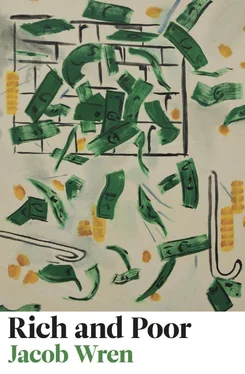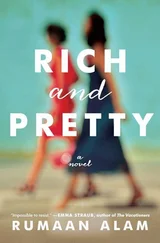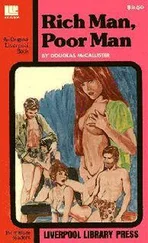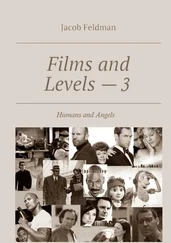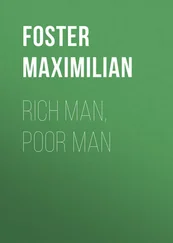Three months go by before I get the first interview, and the time allows me to thoroughly prepare. On my way there, I shoplift a second copy of his book to read while I wait. It is a careless risk, since if I was caught my entire plan would be sabotaged. But it’s a risk I take because I believe my interest in him will serve me well with potential employers, and bringing my own destroyed copy would be out of the question. While in the waiting room I read from where I left off and, once again, have an unbelievable urge to hurl the book across the room. I restrain myself, but possibly the men sitting on either side of me can feel my anger, feel my body tense. From that point on I only pretend to read, instead using the time to eavesdrop.
The room is full, it seems they’re interviewing a lot. Many of them know each other, have worked together in the past, and their conversations are friendly yet empty. If I get the job I will also need to talk this way so I listen carefully: sports, porn, a few of them have travelled and they speak about deserts, sand and heat, about burqas and exotic prostitutes. There are many terms, mostly slang, that I don’t understand. From the context I believe these terms refer either to guns or vehicles, except for the filthy ones that I generally know already. I make mental notes, planning to look things up later, still pretending to read. Once inside, the interview is straightforward. I make a good impression, but I’m not as experienced as many of the other candidates. From the way they explain this to me, I have a slight feeling it might even work to my advantage. Perhaps there are placements where they prefer to train people from scratch. I have a dishwashing gig that night and go directly from the interview to the kitchen, where they make fun of me for being all dressed up. I tell them I just came from a wedding, make up a story about the bride mistakenly saying “do I?” instead of “I do.” Everyone laughs. I don’t know where this story came from, I pulled it straight from thin air. I’m pleased it got a laugh, eased any suspicions arising from the way I was dressed. The story came from my need to defend myself, protect myself. I wonder how many stories in the world emerge in precisely this way.
1.
All of this is not to suggest, even for a moment, that I did not love and respect my father. While some friends might have advised me to edit out the previous hospital scene, it is my intention here to portray my life in all of its nuance and complexity. It is also true that we, all of us, are never quite as complex or clever as we think (or want to be). In this respect I am not so different from anyone else.
The daily operations of a multinational corporation, one of the largest in the world, are understandably complex. How one deals with such astonishing daily complexity is the true test of one’s character. If I compare myself to a few individuals in charge of rival corporations, I can see that my approach and style are almost completely contrary to the ruling wisdoms of the day. For example, while most companies aim for constant, year-over-year growth, I prefer periods of relative calm (that sometimes last several years) followed by spectacular bursts of energy and expansion. It is within these sudden bursts, unexpectedly, that the entire world opens up. For a brief window, the impossible feels possible again. It is important that within these bursts, as I like to call them, everything is entirely unexpected, both for me and for my many employees, that our daily reality is suffused with the purer elements of surprise.
Years of careful planning drain an endeavour of energy, whereas the sudden conquests I envision, in actual fact, cannot be planned. That is what we have learned. These endeavours rely on the irrational, on irrational decisions made by so many of the key players involved, myself included. Investors surging forth on violent waves of excitement or falling away when blindsided by off-kilter fear. Rival CEOs or executives having no idea how to react to an energy, a way of thinking, they have no previous interior experience of, panicking, signing up or caving in. When it all happens fast, the entire landscape can be rearranged before anyone realizes what has happened, in best-case scenarios to my considerable advantage. Of course, all of these strategies, these desires, can easily backfire. Nonetheless, these are the risks, the challenges, the gambles, upon which my heart thrives.
A few weeks ago I was on the street and saw two children fighting. I like to watch children fight. One learns so much about human nature in the different ways each child enters the fray. Do they wait for an opening or charge forward without thought, take the punch like gasoline poured on the fire of their blind rage or dodge every blow as if not getting hit was the sole accomplishment possible. These children were younger than most, and they were laughing. They found their own pre-adolescent brutality almost ludic, so I assumed they must be friends. However, their friendship didn’t prevent them from doing damage. One of them was bleeding from the face — so much blood I couldn’t spot the wound — and he was laughing, head-butting, working to get as much of the blood on his opponent as possible. Until the other one, the one not yet bleeding, grabbed the blood-soaked jacket, managing to rip it straight up the seam, and they both stopped cold, stopped laughing, froze in tableau. “You ripped my jacket,” the bloody one said, as if not sure what his reaction should be, as if his opponent had broken some unspoken rule. It was a serious moment, unexpected. You never know what will happen, what might cause the dynamic to shift.
2.
Didn’t get the job but still have two more chances. I’ve been fully immersed in my private security research and am confident I will do even better next time, at the next interview, that each one will be better than the last. At the same time I’m considering other strategies. If I can’t work as his bodyguard, there must be other ways to get close, as a servant in his home or waiter at some function he is scheduled to attend. Luck — the good luck that is involved in getting any sort of gainful employment within the current dreadful state of our economy — will be one thing, and I do hope that I have some. However, careful planning, searching for every possible opening or opportunity to get close to him, to get the piano wire close enough to his throat, will be much more important.
When I was a child, we had a piano in the house and I would play every morning for three hours. If something happened, for example if I overslept, and one morning could only play for two hours, I would spend the entire day feeling things had gone wrong, practice an extra ten minutes for the next six days in order to make up the loss. I don’t know if I had the natural talent to become a concert pianist. I had dedication and never faltered. Today, I could easily give piano lessons and make more money than I do washing dishes, have an easier life, but then again I can’t because the memories are too painful. When the ones I loved needed me most, when it was time to fight, I was off somewhere playing piano for money, completely detached from their needs. That’s so long ago I barely remember, have blocked it out. Now I’m focused on other questions, more pressing concerns, related yet brought into the present, since that tragic story was just one among thousands; similar things happen every year, and it’s getting worse.
I am trying to remember the last time I played piano, guessing it was about fifteen years ago. In fact there was no last time, no clear decision to stop. Only new obsessions that gradually devoured my days so there was eventually no time for anything else. Still, I would like to recall the last clear memory I have of sitting in front of a piano to play. There was a competition; it might have been my last, but possibly there were a few more after. I believe I may have won, or at least come very close. I feel I had made an unusual choice as to what I played, Rachmaninoff or Scriabin. One never wins with unconventional choices, but I was long past the point of caring. As I played my thoughts weren’t on the score, weren’t on the notes, weren’t on the beautiful instrument in front of me. All I felt was anger, an anger larger than music, larger than the world. My fingers hit the keys with an intent to smash them, to tear the piano to shreds. I didn’t hear the applause, sat at the piano and stared straight ahead. Someone had to come take me off stage, walk me away from the piano like they were helping an elderly relative up the stairs. That perhaps wasn’t the actual last time I played, but it might as well have been. My success meant nothing when placed alongside the realities of the day.
Читать дальше
